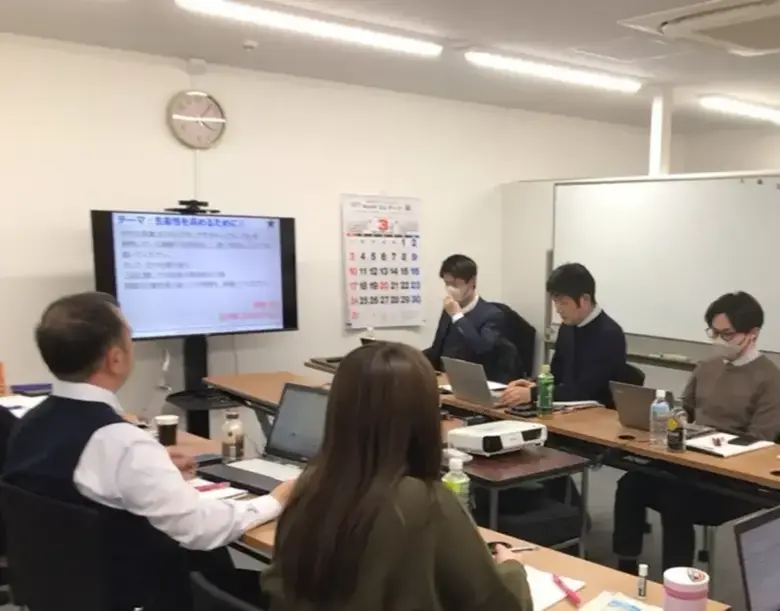Study Group for Productivity Improvement and Work Efficiently (Final Session)

This will be the final lecture given by instructor Mr. Matsubara for Organizational Theory Corporation.
The lecture covered a review of previous sessions, along with the importance of planning (setting goals) and establishing habits.
The instructor asked, "Do you set goals with profitable action in mind? And do you consciously reflect on those goals?"
As students, it's natural to set study goals to achieve good test scores. However, once we enter the workforce, we often get so caught up in daily tasks that simply getting through the day can exhaust all our energy.
In this session, we learned the importance of setting goals, taking action, and making feedback. By making this process a routine, new goals will emerge, ultimately enhancing the company's profitability.
What struck me deeply was the concept that feedback—essentially constructive criticism—is actually an "opportunity for awareness."
I had always tended to view feedback in a negative light. However, Mr. Matsubara explained that feedback is not something negative; it’s an opportunity for self-awareness. He said, “Isn’t this the perfect chance to change your perspective?”
We were also taught that it’s essential to use the PDCA cycle to work toward goals and continually improve them.
In the book The Habits of the Top 5% Employees Identified Through AI Analysis by Shinji Koshikawa, it’s noted that top-performing employees engage in "Actions for achieving results," which are not particularly extraordinary actions. Instead, these actions include:
・Pursuing the causes of both success and failure
・Making this pursuit a habit
Here, I resonated with an opinion shared by one of our employees: “When we fail, we seek for feedback, but when we succeed, we often leave it that way.” Additionally, employees with lower productivity tend to use more negative words, which often reflects a mindset focused on assigning blame to others.
In the end, I was delighted to hear from one of our employees, who said, "We had left the construction project delivered, and I hadn't taken the initiative to follow up with the client. From now on, I will make it a point to seek feedback from clients, even for projects that went smoothly." This highlights the importance of seeking feedback even after achieving success.
The act of seeking feedback corresponds to the "C" in the PDCA cycle, and I believe through this action, individuals can effectively implement the PDCA cycle in their own work.
Our CEO emphasized that it's essential to adjust our habits to align with our goals, and to make this adjustment a habit itself.
Eikoh will make use of this lecture as nutrient for further growth. We will start taking action from the day we learn.
In the 2024 fiscal year, we will strive to ensure that employees can embark with clear goals!
The lecture covered a review of previous sessions, along with the importance of planning (setting goals) and establishing habits.
The instructor asked, "Do you set goals with profitable action in mind? And do you consciously reflect on those goals?"
As students, it's natural to set study goals to achieve good test scores. However, once we enter the workforce, we often get so caught up in daily tasks that simply getting through the day can exhaust all our energy.
In this session, we learned the importance of setting goals, taking action, and making feedback. By making this process a routine, new goals will emerge, ultimately enhancing the company's profitability.
What struck me deeply was the concept that feedback—essentially constructive criticism—is actually an "opportunity for awareness."
I had always tended to view feedback in a negative light. However, Mr. Matsubara explained that feedback is not something negative; it’s an opportunity for self-awareness. He said, “Isn’t this the perfect chance to change your perspective?”
We were also taught that it’s essential to use the PDCA cycle to work toward goals and continually improve them.
In the book The Habits of the Top 5% Employees Identified Through AI Analysis by Shinji Koshikawa, it’s noted that top-performing employees engage in "Actions for achieving results," which are not particularly extraordinary actions. Instead, these actions include:
・Pursuing the causes of both success and failure
・Making this pursuit a habit
Here, I resonated with an opinion shared by one of our employees: “When we fail, we seek for feedback, but when we succeed, we often leave it that way.” Additionally, employees with lower productivity tend to use more negative words, which often reflects a mindset focused on assigning blame to others.
In the end, I was delighted to hear from one of our employees, who said, "We had left the construction project delivered, and I hadn't taken the initiative to follow up with the client. From now on, I will make it a point to seek feedback from clients, even for projects that went smoothly." This highlights the importance of seeking feedback even after achieving success.
The act of seeking feedback corresponds to the "C" in the PDCA cycle, and I believe through this action, individuals can effectively implement the PDCA cycle in their own work.
Our CEO emphasized that it's essential to adjust our habits to align with our goals, and to make this adjustment a habit itself.
Eikoh will make use of this lecture as nutrient for further growth. We will start taking action from the day we learn.
In the 2024 fiscal year, we will strive to ensure that employees can embark with clear goals!
